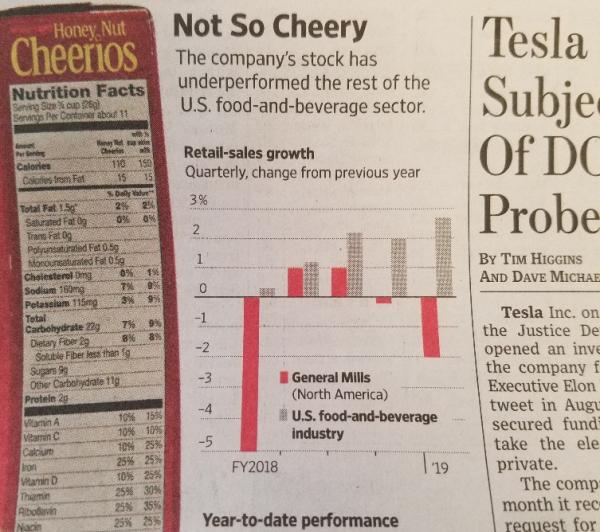A few years ago I was giving a talk at an event along with Brent Smart, CEO of advertising giant Saatchi & Saatchi's headquarters in New York, who had managed their General Mills campaign prior to that.
He talked about why General Mills had rolled out a new non-GMO label on Cheerios. He was literate, funny, and his description of being a prominent executive while only being able to afford a tiny apartment in Manhattan resonated with me. He was also completely wrong about Cheerios and the non-GMO movement. He believed it was about that one issue, and that if his client conceded on that issue the problem would not only go away, sales would go up.(1)
I knew what he did not yet realize. Organic executives do not care really about GMOs, they know they are harmless. And they don't care about chemicals, at the top levels they know their "organic" chemicals are not safer than any "synthetic" chemical. They are going to find something in their competitors to criticize, it is what they are paid to do.
So it was no surprise to me that Whole Foods shoppers did not rush to buy Cheerios any more than they rushed to buy Manwich after ConAgra removed BPA from cans; instead, competing food marketing groups moved the goalposts as smoothly as any of the hard-left activist journalists in the New York University Arthur L. Carter Journalism Institute(2) do. Organic and natural food marketing groups, aided by politically or financially sympathetic academics like Drs. Naomi Oreskes and Marion Nestle, instead complained that Cheerios are still "processed" food and therefore harmful.

Dear Science - if you make GMO Oats I want to know. I will buy them right now. Just take my money! Oh, you don't? So this is just fraud?
Instead of up, sales of Cheerios went down.
I had been able to predict that where very smart ad executives could not because such tactics are right out of the food playbook created by groups like Center for Science in the Public Interest, Ralph Nader, and numerous others for decades. It is the playbook that necessitated the formation of the American Council on Science and Health in 1978, so some national organization could separate true health threats from manufactured health scares for the public.
Here is my advice, for food companies and agricultural companies (both seed and crop protection), gleaned after 12 years as an insider in science communication:
You need to accept that it is not about an ingredient or a process and changing those will not placate your enemies. They are in a war of extinction against you. And most mainstream journalists are politically aligned with anti-science activists against you, even if they grudgingly pretend to be on the side of science. Catering to your detractors while the pro-science community gets hammered for defending evidence and reason and you do nothing is why you lose these fights.
General Mills has had yet another quarterly sales slump but there are bright spots that show they have learned their lesson. Trix sales went up again after they reintroduced artificial colors, and Lucky Charms rolled out “magical unicorn” marshmallows - the company stopped engaging in a War On Fun and preaching to consumers about what their kids should eat and got back to making compelling products. They need to make things consumers will buy en masse, that will be the foundation of a food company.
Yes, wealthy elites will buy yogurt in fancy glass containers and organic pet snacks are going to be popular with people who think their pets are their children, but that is a niche market. It would be a disaster to believe that everyone wants to buy Blue Buffalo because your marketing team was crazy enough to think $8 billion was a smart price to pay for dog food.
NOTES:
(1) Scientists laughed, but for a different reason. Cheerios has long claimed to be made of oats. There are no GMO oats, so how can advertising the "nocebo" of non-GMO oats work? Since the US FDA is supposed to prevent deceptive labels, how was it even legal?
(2) Dan Fagin, Charles Seife et al. Students, do yourselves a favor and go anywhere else. You're going to spend over $70,000 per year (so close to $300,000 of debt unless you are wealthy) to attend a school where the average salary for a professor is $270,000 but somehow only 5 of their 28 full-time journalism faculty even have any advanced degrees: a JD, an MD and three PhDs. Since the nationwide average salary for a journalist is $45,000 unless you are hired as journalism faculty at NYU it could take a long time to earn that money back. If you want to be a journalist, do the kind of real investigative journalism NYU will never teach you to do and then pick a place like University of Missouri's School of Journalism, which has 21 faculty with PhDs and tuition a far more reasonable $11,000.




